Marketing in the healthcare sector has evolved to replace conventional brochures and billboards. Contemporary healthcare providers have used novel tools and approaches to connect with patients, establish trust, and enhance patient engagement. With the emergence of digital platforms, the healthcare sector is adopting new technologies, including automation, CRM, AI-driven analytics, and social media, to target the right audience at the right time.
Healthcare marketing involves a particular combination of compassion, precision, and conformity, unlike generic marketing. The current patients are digitally literate and research, read reviews, and compare services on the Internet, expecting individual communication. This change implies that healthcare brands will now have to use tools that not only assist in outreach but also aid in patient education, appointment scheduling, and feedback gathering.
The new marketing tools can range from reputation management tools, which track comments and reviews on the internet, to SEO-based software that ensures your clinic appears in local searches, among others. They are revolutionising the way healthcare institutions grow and serve. Whether you want to run specific email campaigns or manage content across multiple channels, these tools can make marketing activities more efficient and help create long-term relationships with patients.
In this blog, we will discuss the best modern healthcare marketing tools that can enable the capitalisation of clinics, hospitals, and solo practitioners in the contemporary competitive environment.
Why Does Healthcare Need Modern Marketing Tools?
- Strength in Patient Engagement: When using tools, communication becomes more personal, and the patient experience is enhanced.
- Increased Internet Presence: SEO and social media tools enable clinics to appear in local and organic listings.
- Optimise Flow of Appointment: Computerised verification makes it easier to book a place and avoid missed appointments.
- Monitor the actions of the patient: Analytics tools provide an overview of the services that the patients are seeking.
- Reputation Management Booster: The platforms are used to track and address reviews on the web.
- HIPAA Compliance: Contemporary instruments are designed to ensure the privacy and protection of data.
- Support Multi-Channel Campaigns: Manage email, SMS and social advertisements on one platform.
- Reduce Workload: Marketing automation saves time, allowing personnel to focus on care.
List of Top Modern Healthcare Marketing Tools
1. Mailchimp
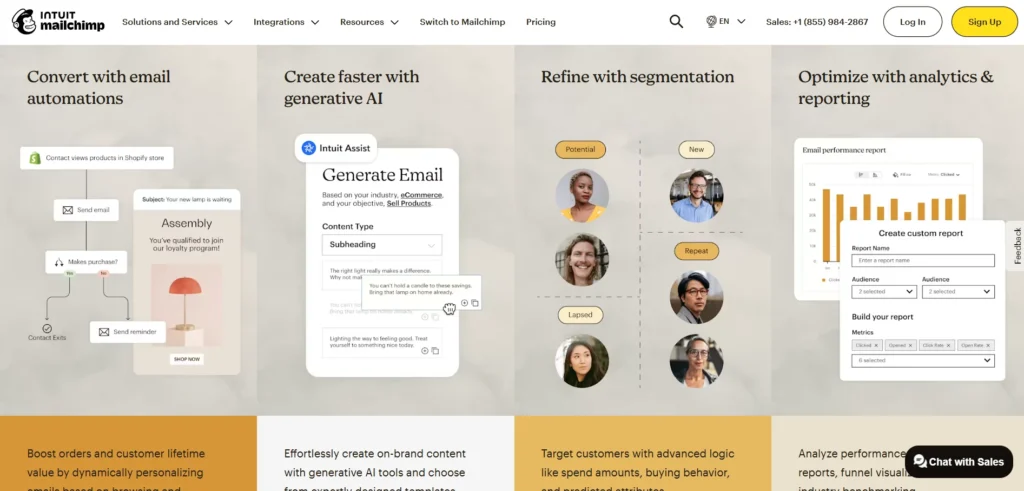
It is a popular email marketing service used by marketers in many healthcare industries, including Pharma, to communicate with existing patients and potential patients. It isn’t exclusively a healthcare product, but it provides a strong set of campaign-building, automating, and analysing features.
Healthcare organisations can apply it to do newsletters, appointment reminders, health tips, and wellness updates. Its templates can be customised easily, and segments supported on the platform include A/B testing, segmentation, and behavioural targeting. The smaller practices suit Mailchimp, since it is inexpensive and easy to use. It also lacks HIPAA compliance by default; however, the system should treat sensitive patient-related information with caution by the user.
Key Features:
- Drag and drop Email campaign builder
- Targeting and segmentation of the audience
- A/B testing and campaign optimisation
- Reporting and an intricate analytics dashboard
- Auto emailing and triggering
- Connection with different CRMs and apps
Pros:
- So simple to install and operate
- Small practices will have inexpensive prices.
- High quality of templates and design
- Patient education and engagement are great
- A good newsletter campaigner
Cons:
- Not HIPAA compliant by default
- Hoard of facilities in the free plan
- Not easy to work with big databases
- None of the built-in CRM within the healthcare field
- Requires third-party applications to automate other than email
2. HubSpot healthcare
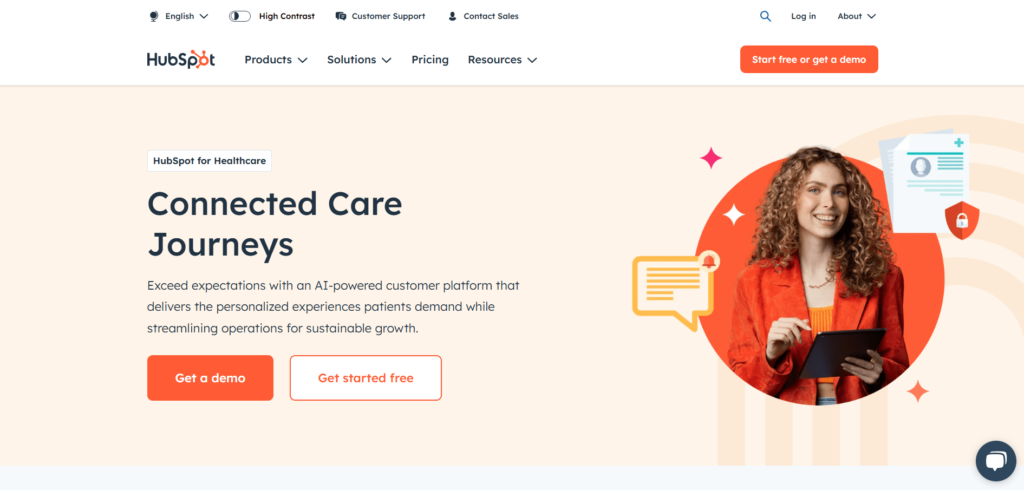
HubSpot is not a healthcare-specific product, but it is the most popular choice among healthcare marketers due to its robust inbound marketing capabilities, CRM abilities, and email automation. Healthcare providers can engage in personalised campaigns with HubSpot and manage patients’ journeys, measuring engagement across various channels when working with the product.
The ease of use and easily editable dashboards make it a great option, as it is most suitable for supporting small to mid-sized practices that want to expand to more patients and enhance online engagement. The tool can work with landing pages, blogs, email marketing, and search engine optimisation tools, as well as provide detailed reporting, making it possible to achieve an effective healthcare marketing strategy. Integration with health tools:. HubSpot can also be integrated with a range of healthcare tools, but a bespoke setup may be required to ensure HIPAA compliance.
Key Features:
- CRM/ marketing suite package
- Drag and drop HTML-based email and landing page builder
- Tools of SEO, content marketing
- Workflows and automation Custom
- Online reporting and reporting Tech
- Healthcare app integration using API
Pros:
- Non-tech friendly in operation, Easy to use.
- It is excellent for content campaigns
- Firm community and support resources
- Superior lead-nurturing features
- Growing scales Scale shares
Cons:
- The HIPAA compliance setup must be done manually
- Few indigenous healthcare extension ones
- Add-ons grow fast in cost
- Not connected to EHR
- Requires possible third-party tools to be compliant
3. Salesforce Health Cloud
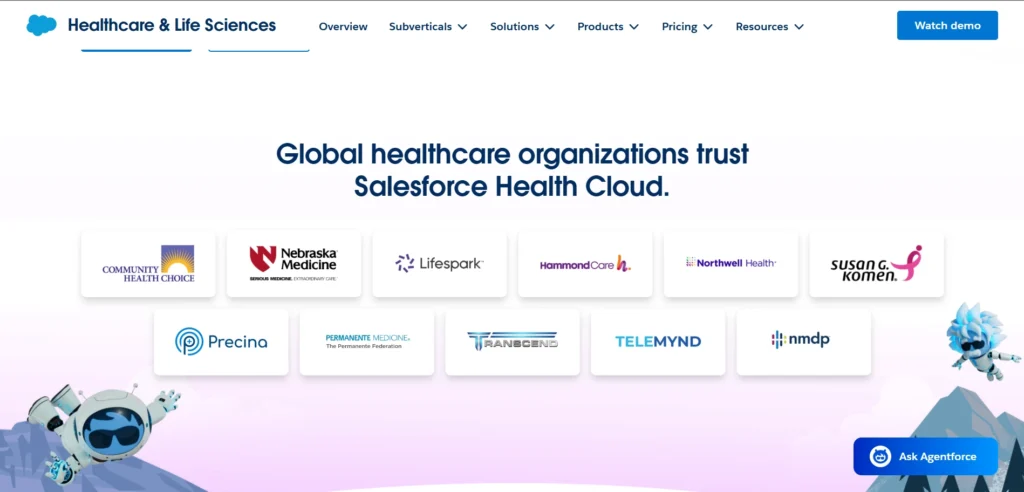
Salesforce Health Cloud is a customer relationship management system specifically designed for the healthcare sector. It also integrates CRM functionality with real-time patient data to deliver a 360-degree view of the patient journey.
The platform is trusted to enhance communication means, care coordination, and marketing outreach, enabling healthcare providers to divide patients, personalise interaction, and automate their workflows. It offers powerful functionality that supports both B2C and B2B healthcare models, allowing organisations to build stronger relationships and comply with HIPAA and other relevant privacy laws.
Using AI-driven analytics and seamless integrations with EHR systems, the Salesforce Health Cloud has enabled a marketing team to provide customers with highly accurate, time-sensitive campaigns developed based on patient history, preferences, and engagement rates.
Key Features:
- Real-time data is stored on centralised profiles of patients
- HIPAA storage cloud infrastructure
- In-app AI to gain insights into the future
- Patient segmentation and campaign management
- EHR and third-party integration
- Automation instruments of marketing
Pros:
- Gives high levels of personalisation at scale
- Excellent data protection and compliance functions
- Efficiencies in marketing and care coordination
- Good campaign analysis Stats
- Can be integrated easily with the topics of major healthcare platforms
Cons:
- It will cost small clinics or individual practitioners a fortune
- Takes time and experience to install
- Certain features can prove to be complicated for new users
- Implementation time can be furthered by customisation
- Poor offline support selections
4. Zocdoc
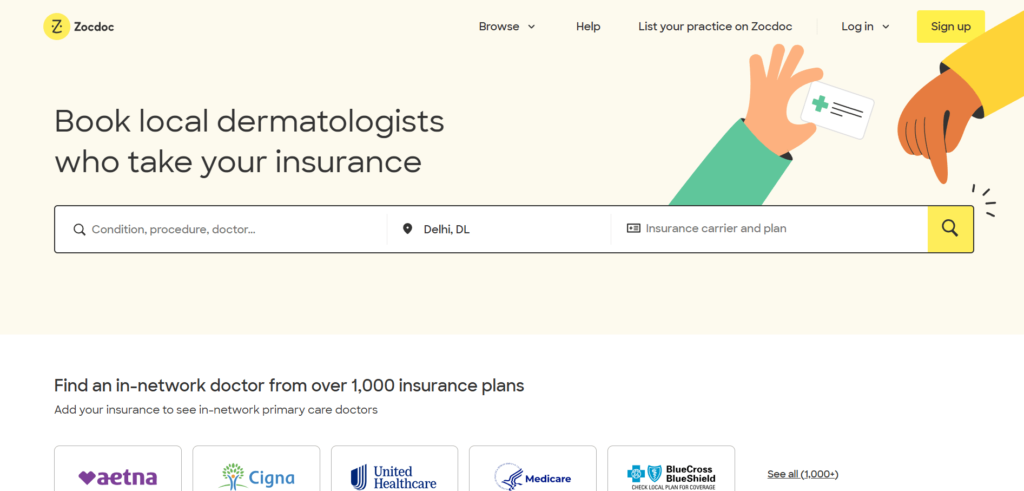
Zocdoc is a patient-focused web-based company that enables healthcare professionals to market their services to patients seeking care online. Posting their practice on Zocdoc will make them more visible, allowing patients to book appointments in real-time and have their practice reviewed, which helps build trust and attract more patients.
The site offers targeted advertising and profile promotion services that can help a clinic stand out in competitive regions. Zocdoc also enables patients to search by insurance, speciality, and availability on their schedules, which is an excellent marketing and scheduling tool for solo practitioners and small to mid-sized healthcare facilities.
Key Features:
- Attendance is based on patient scheduling and booking on the Internet
- Confirmed patient evaluations and ratings
- Filter/search insurance
- Confirmations and reminders on appointments
- Changeable provider profiles
- Marketing and appearance-raising tools
Pros:
- Makes it more visible on the Internet
- Makes scheduling more efficient for patients
- Creates confidence with proven reviews
- Assists in filling up spot appointment slots
- The app increases convenience
Cons:
- Stiff competition in the platform
- Per appointment, fees can be high
- Dissimilar listing personalisation
- It may be used to result in overbooking when it is not well managed
- Certain functionalities are inaccessible in higher-paying schemes
5. Doximity marketing solutions
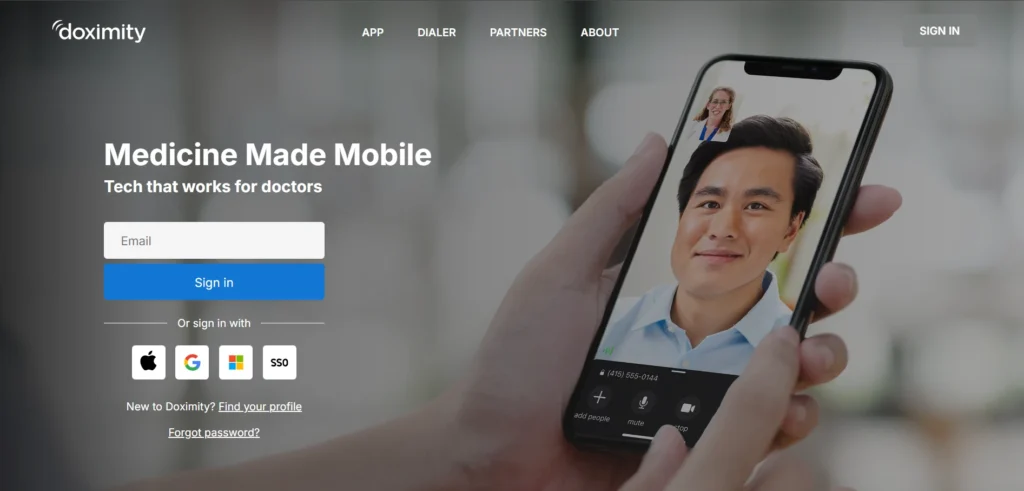
Doximity is a digital social network specifically oriented toward medical professionals, often referred to as the LinkedIn of doctors. Its marketing solutions enable healthcare organisations to reach an approved network of over 2 million medical professionals within the U.S. This is why it can be used ideally as a B2B tool in the medical industry to market services and products, recruit physicians, and introduce treatment technologies.
Targeted advertising that Doximity has to offer comprises native content, banner advertisements on mobile and through email, and can be customised to specialities, geography and behaviour. All the tools it offers to correspond with HIPAA requirements ensure that the marketing process does not intrude on the privacy of the healthcare environment, while at the same time allowing for the most effective professional outreach possible.
Key Features:
- Getting in touch with a verified network of medical professionals
- Targeting on speciality and location
- HIPAA-compliant messaging client
- Medicine tools
- Mobile first content delivery
- Elaborate performance and ROI tracking
Pros:
- Exact reader base of licensed physicians
- Excellent as an outreach as well as an education tool for physicians
- Increases native content in boosting credibility
- Safe, risk-free communication applications
- Reliable system in the medical field
Cons:
- By definition, only B2B healthcare marketing
- Greater price than generic platforms
- None of the characteristics of patient marketing
- They primarily target the U.S. professionals
- Limited flexibility of campaign personalisation
6. Hootsuite
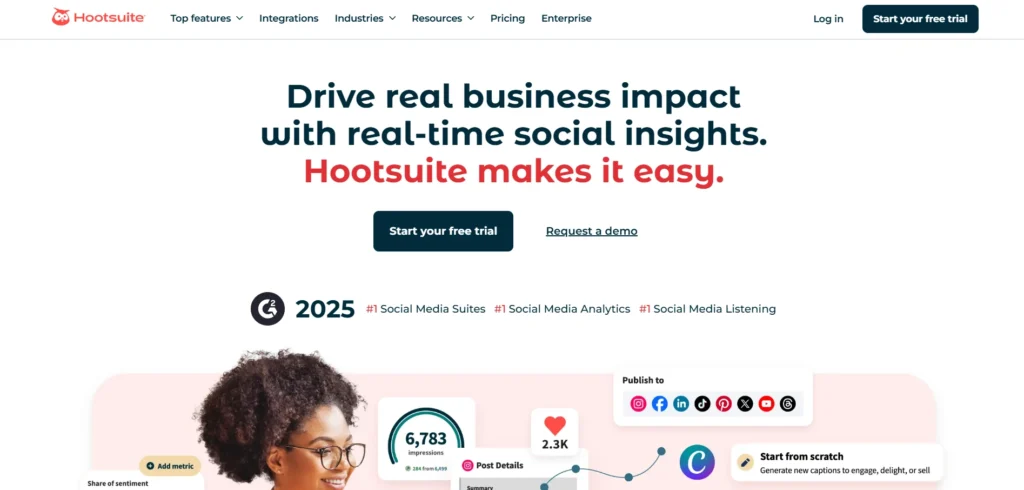
Hootsuite is a social media management tool that enables marketers in the medical field to schedule, manage and analyse social media publications through Facebook, Twitter, LinkedIn, and Instagram. Although it is not specific to the healthcare industry, it is easy to use and has broad compatibility, which makes it a critical tool for maintaining a consistent digital presence.
Hootsuite offers clinics and hospitals the opportunity to publish national content, provide expert advice, offer feedback, promote their services, and stay informed about the latest treatment news. The tool provides collaboration options, compatibility with content libraries, and analytics, enabling healthcare brands to be active, engaging, and responsive on social media.
Key Features:
- Post scheduling across multiple platforms
- Content calendar and planner
- Social media monitoring in real time
- Group work applications
- Comprehensive social analytic reports
- Adding Canva, Dropbox and so on
Pros:
- Conserves time through the process of bulk scheduling
- Excellent for coordinating in different places or teams
- Assists in keeping branding steady
- Staff are easy to train to use
- Enables measuring and correcting performance
Cons:
- It was not designed particularly to support healthcare
- No integrated tools to be HIPAA compliant
- Restrictions on the configuration of low-level plans
- It may cost too much with larger teams
- Needs a third-party content strategy
7. Moz Pro
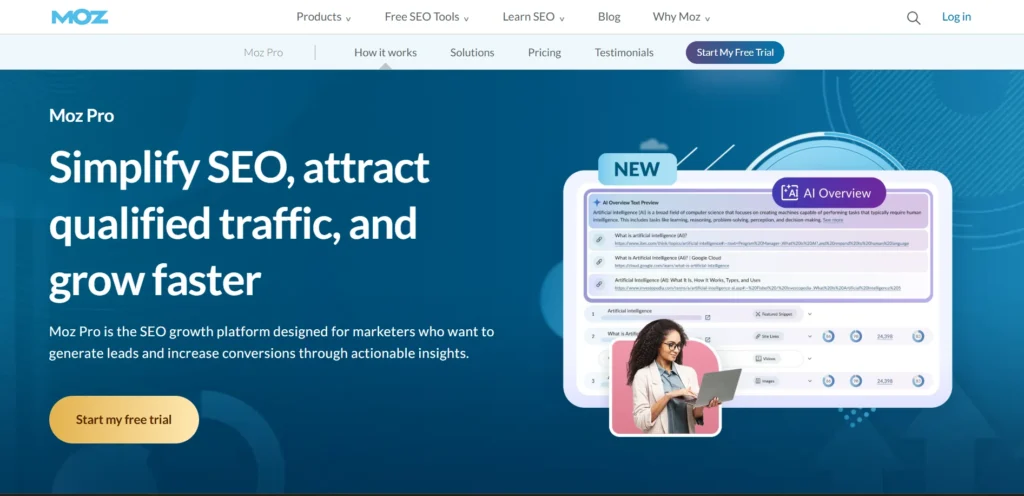
This is an all-inclusive SEO tool that helps healthcare providers enhance their website’s visibility in search engines. It is increasingly important to have a strong online presence, as more patients use Google to search for doctors, clinics, and services. As one of the widely used Healthcare Marketing Tools, Moz Pro offers keyword research, site audits, rank tracking, and backlink analysis to ensure your healthcare site ranks high in relevant search results.
While it is not healthcare-specific, it is popular among digital marketing teams working in medical practices, hospitals, and wellness centres to bring in organic traffic. The simple dashboard and insights presented by Moz can help marketers improve their local SEO, attract more patients, and outperform the competition.
Key Features:
- Keywords search and rank monitoring
- Recommendations on on-page SEO
- Site auditing Technical
- Backlink monitoring and link building
- Clinic local SEO
Pros:
- Increases the way people see locally based healthcare searches
- User-friendly interface and high-performance tools
- Enhances organic traffic as time goes by
- Assists in discovering fast SEO problems
- Superb aid and teaching material
Cons:
- Not HIPAA or healthcare optimised
- Heavy learning curve for the new user base
- It may be expensive for small practices
- Poor healthcare CRM links
- No direct compliance support for content
8. Sprout Social
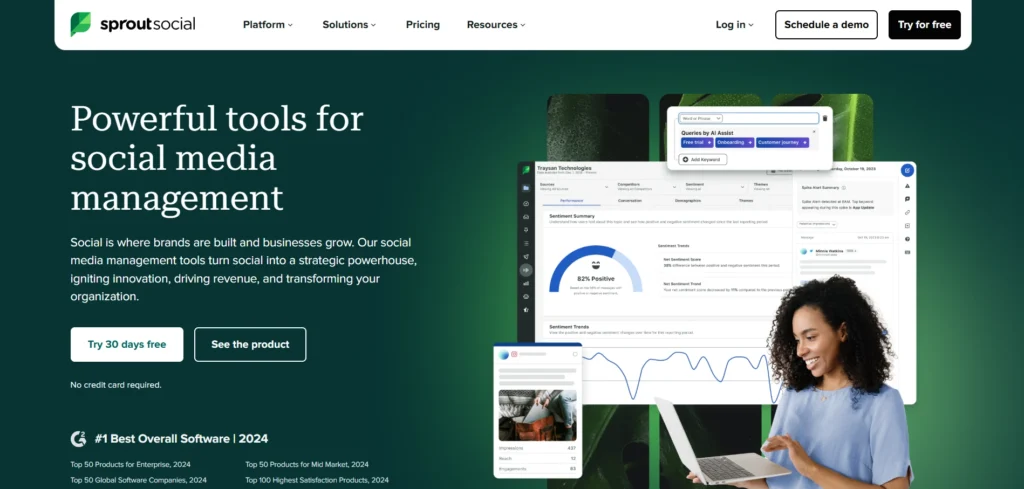
SproutSocial is a powerful social media management tool that enables healthcare marketers to engage and track all social media platforms. Sprout Social also allows healthcare marketers to manage and schedule content on all social media platforms. It is particularly beneficial for a larger healthcare system or multi-location practice that requires collaboration, workflow for content approval, and audience engagement features.
Sprout Social offers excellent social listening, customer care, and analytics features, enabling brands to connect with their audience in a meaningful way. It is not designed with healthcare in mind, but it can be customised to follow HIPAA practices when used appropriately. The CRM-like capabilities are also helpful, since they help determine the sentiment and engagement trends of patients.
Key Features:
- Scheduling and posting to cross-platforms
- Patient sentiment tracking – social listening
- Collaboration and approval processes: Immersive teamwork
- Performance reporting and reporting Analytics
- Inbox with cohesive contact Smart inbox
- Custom libraries with tags of content
Pros:
- Suitable for multi-location healthcare brands
- Extended analytics dashboard
- Approvals on content workflows
- Superb customer service
Cons:
- Superior costs as compared to simple social tools
- They are not HIPAA compliant at all, right out of the box
- Needs training to get used to
- The few direct integrations with health care CRMs
- Can store gadgets that are not required for a small clinic
9. Doctor.com
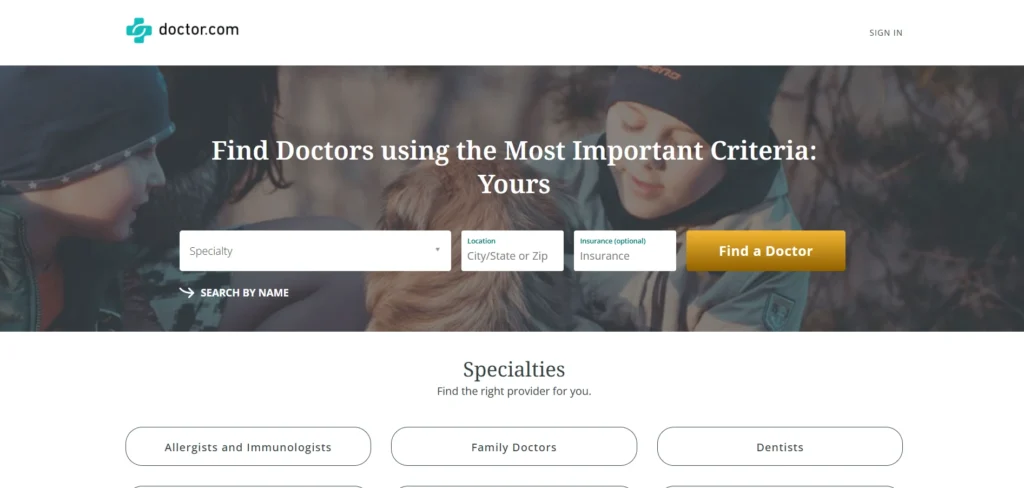
Doctor.com is a marketing platform limited to the healthcare industry and is intended to assist providers in building their online presence, reputation and attract more patients. It keeps the provider profiles in sync on over 60+ directories such as Google, Healthgrades, Vitals, and Yelp, which keeps the information updated wherever the patients look. Doctor.com will also allow gathering and handling validated patient reviews, which enhances the reputation of your practice.
It is one of the most desired solutions offered with features of reputation monitoring, appointment scheduling, and telehealth integration in independent practice, hospitals, and health networks. It offers specialised tools to assist businesses with HIPAA compliance and too, and its speciality is its capability to market specifically to the healthcare industry. In that respect, it becomes a highly specialised but mighty tool within the digital marketing tool belt.
Key Features:
- Directory listing and directory profile synchronisation
- Reputation management tools on the Internet
- Automatic collection of patient review Automated collection of patient reviews
- HIPAA-compliant messaging
- Scheduling and telemedicine
- Analytics of reporting and performance
Pros:
- Constructed specifically to meet the needs of healthcare givers
- Exposure to large platforms increases exposure to large platforms
- Streamlines the process of reviewing and collecting the patients
- The increased confidence among potential patients
- Saves time consumption in manual updating
Cons:
- Constrained to the directories of the U.S.A.
- It can be expensive for a small practice
- Not all updates are updated at the same pace on all platforms
- Reporting tools may seem primitive
- Needs to be constantly checked to remain efficient
10. PatientPop
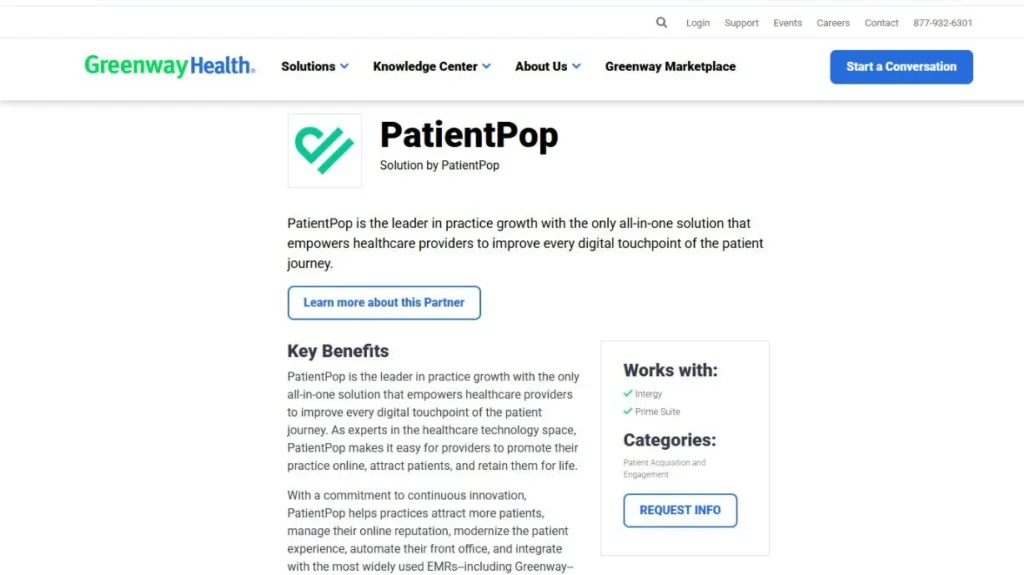
PatientPop is an end-to-end healthcare practice platform and works exclusively with healthcare providers. It has the tools necessary to design your websites, SEO, online scheduling, reputation management and patient contact, within a HIPAA-compliant environment. The site assists doctors and clinics in acquiring new customers, building momentum online and increasing their efficiency.
It is highly automated, so you can manage appointment reminders, feedback requests, and electronic forms without any effort. PatientPop is also suitable when it comes to small healthcare businesses and any kind of private practice that needs a multipurpose yet easy-to-use patient acquisition and patient retention tool in the competitive market.
Key Features:
- Marketing automation that is HIPAA compliant
- Site design and local SEO optimisation
- Online booking and reminders for appointments
- Medical surveys and review of patients
- Reputation and listing management
- Performance analytics dashboard
Pros:
- Healthcare marketing was developed specifically for that purpose.
- Patient interactions that are easy to manage
- Enhances local search ranking
- Can minimise cancellations, or no shows with follow-up reminders
- Provides a convenient UX to the patient
Cons:
- Small practices in solitude may not be suitable for pricing
- Templates have few customisation options
- It requires some time before it is seen in SEO results
- There are also users with complaints about limited kinds of support
- Not as effective with big multi-location groups
11. CallRail
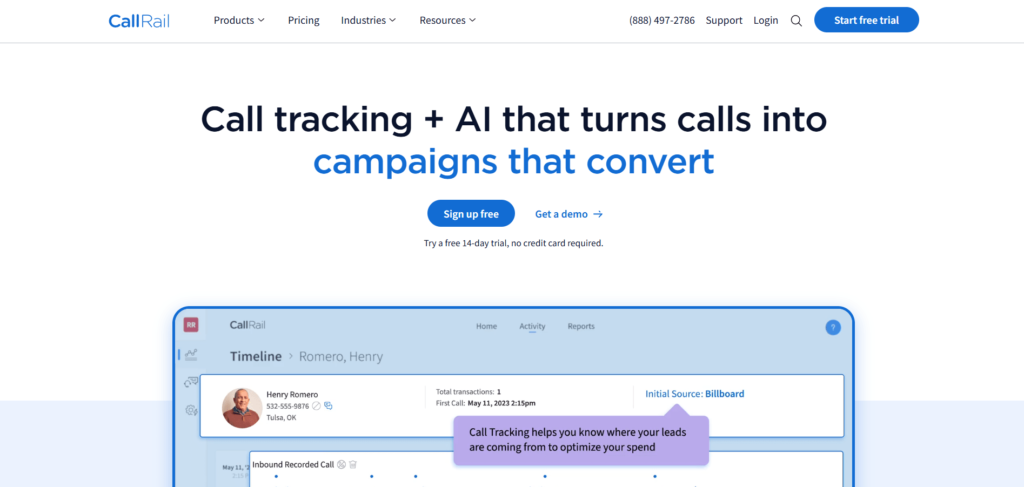
CallRail Call tracking and marketing call attribution Call tracking and marketing call attribution CallRail is a service to help healthcare marketers find out which campaigns are leading to patient calls and appointments. Being able to use different phone numbers for different advertisements, keywords, or even channels, CallRail enables clinics to know what works and enables them to maximise marketing expenses.
It records calls, does real-time analytics and has built-in CRM methods of recording leads. CallRail is particularly helpful in healthcare practices whose work mainly occurs via phone calls. Although it does not amount to a comprehensive marketing device, it will be central in completing the loop between marketing and real patient conversion.
Key Features:
- Campaign tracking using dynamic number insertion
- Transcription and call recording
- Keyword-level attribution
- Google Ads and analytics integration
- Call analytics/reporting in real-time
- Call data handling that is HIPAA-compliant
Pros:
- Campaign-generated tracks that elicit calls
- Installed and operated very easily
- Assists in maximising advertising expenses
- Enhances the training by receiving an improvement through call recordings
- Strategies bettered with call reports in a detailed order
Cons:
- It is not a full marketing solution
- Noted down records are not always right
- Tech support may be needed to get it installed
- Narrow visual dashboards
- It may prove to be expensive when there are large calls involved
12. Healthgrades
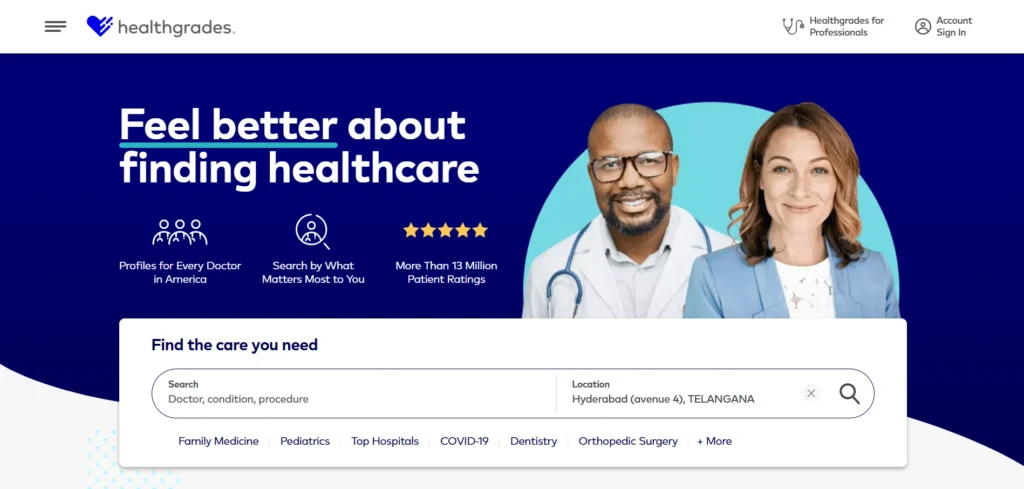
Patients look for, compare, and review healthcare providers on Healthgrades’ platform. It also provides marketing services that enable healthcare providers to manage their profiles, attract patients, and promote services through premium placements. With over 30 million monthly visitors, Healthgrades enhances visibility, trust, and appointment bookings.
Healthcare marketers can collect patient reviews to improve reputation management, online image, and engagement metrics, gaining valuable insights on how patients interact with their profiles. As one of the leading patient-facing digital marketing platforms, its solutions are customised specifically for healthcare institutions.
Key Features:
- Improved provider profiles and visibility
- Verified patient reviews and ratings
- Appointment scheduling integration
- Reputation management and review response tools
- Patient engagement analytics
- Advertising and sponsored listings
Pros:
- High traffic platform boosts visibility
- Verified patient feedback builds trust
- Patient acquisition campaigns support.
- Local competitor comparison
- EMR and scheduling tool integration
Cons:
- Costly premium features
- Paid advertisements are necessary to gain visibility
- Limited profile customisation
- Profile moderation concerns
- Primary focus overseas
13. SimplePractice
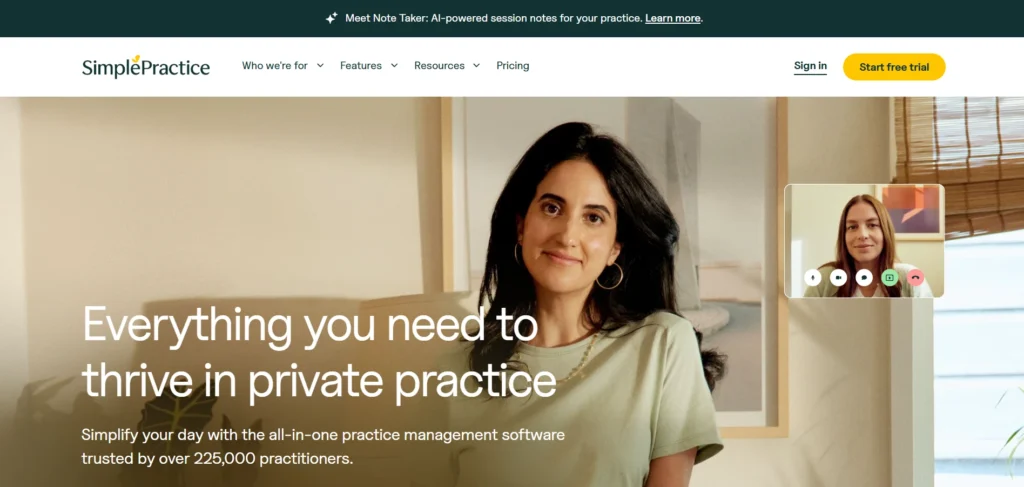
SimplePractice serves as both an all-in-one clinic management application and scheduler that caters to niche practitioners and small-sized clinics. Apart from the scheduling, billing, and providing telehealth services, SimplePractice has powerful marketing tools such as custom client portals, automated reminders, and even SEO friendly templates for websites.
Providers can set up their branded accounts, receive online bookings, and manage communications with patients in a HIPAA-secured space. The mobile app, coupled with automation, improves client retention, client acquisition, and overall streamlines practice operations for counsellors, therapists, and wellness professionals.
Key Features:
- Client portal with HIPAA compliance.
- Custom-built website with SEO capabilities and tools.
- Booking systems with automated reminders.
- Intake and consent forms are digital.
- Secure video conferencing telehealth.
- Billing and payment systems with built-in invoicing.
Pros:
- With solo practitioners and small practices as the primary target, these features come in very handy.
- Simple to use and get started.
- One of the few solutions that combine marketing with patient management.
- Increased trust and convenience for patients.
- Increased flexibility from mobile systems.
Cons:
- Unsuitable for larger clinics and hospitals.
- Websites have limited personalisation options.
- Missing advanced features for generating analyzable data.
- Marketing functions are auxiliary.
- Extra fees for providing telehealth and insurance claim billing services.
14. PracticeBloom
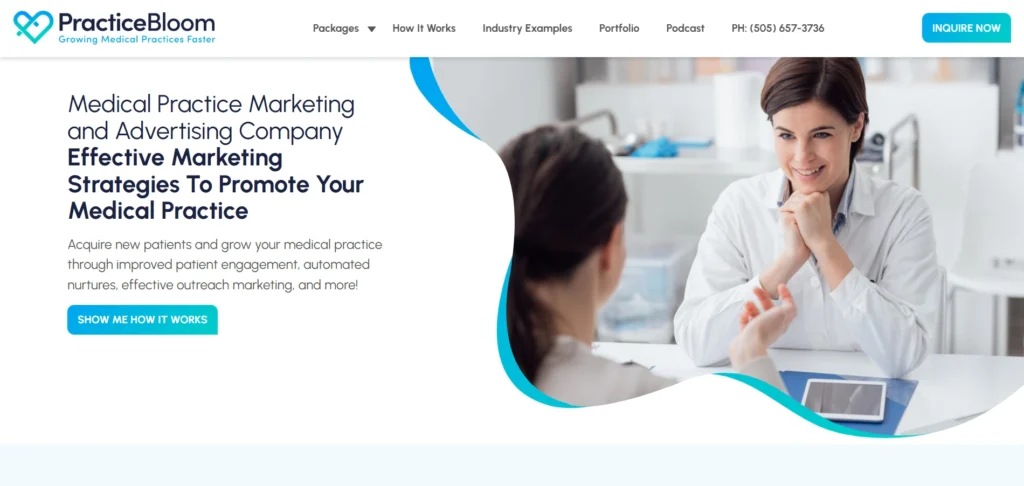
With a focus on private practices and medical spas, PracticeBloom is a healthcare digital marketing agency that specialises in performance-based marketing. It emphasises lead generation through SEO, PPC advertisement, website creation, and patient conversion optimisation.
PracticeBloom differs from DIY services because it has devoted account managers, custom strategy planning, and full-service execution which is ideal for practices that wish to outsource their marketing. Using HIPAA-compliant tools alongside the analytics reporting provided, the agency maximises ROI while ensuring data privacy for its clients.
Key Features:
- Custom healthcare marketing strategies
- Website creation with patient conversion funnels
- SEO and PPC campaign management
- Lead tracking that’s HIPAA-compliant
- Call tracking and analytics dashboard
- Monthly performance reviews and ongoing support
Pros:
- Minimised workload from a done-for-you service
- Strategy customisation for different specialities
- No in-house marketers needed
- ROI-centric campaigns
- HIPAA-compliant strategies available
Cons:
- Monthly retainer fee or contract required
- In-house marketing teams have less control
- Competitive results are affected by location
- Solo practitioners are deemed cost-prohibitive
- Limited scalability for large hospital systems
15. CareCloud
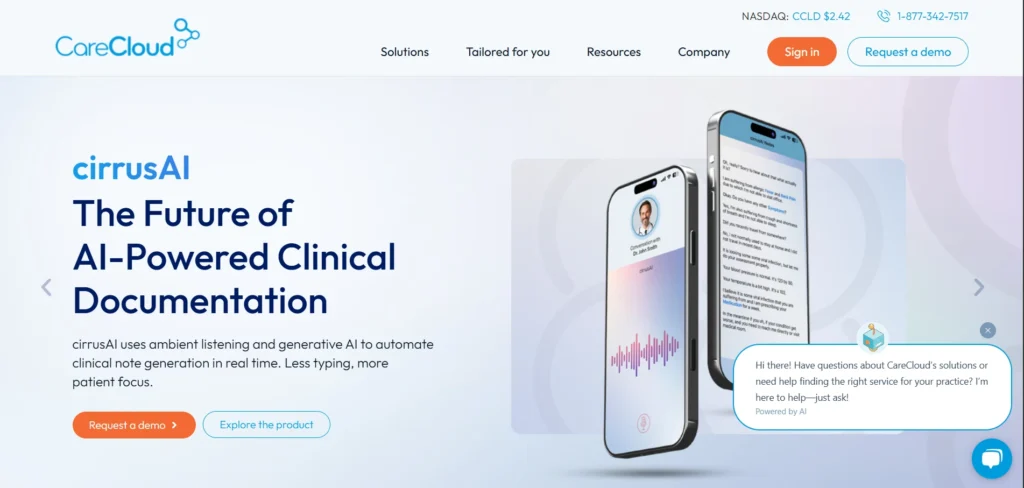
CareCloud is an all-in-one electronic health record (EHR) and practice management solution that offers a full-featured practice management system, revenue cycle management, and tools aimed at enhancing the patient experience.
Besides its clinical and operational marketing functions—like patient retention and satisfaction automation, patient engagement, telehealth, and automated telephonic outreach—CareCloud is useful for retention and satisfaction purposes.
Healthcare marketers will find CareCloud useful for gathering patient feedback, managing engagement metrics, scheduling reminders, and other functions, all within HIPAA-compliant frameworks. This software is ideal for mid-sized practices that are searching for a unified system that supports operational efficiency and advanced patient-focused marketing tools.
Key Features
- Telehealth with self-check-in for patients
- HIPAA-compliant communication tools
- Engagement and outreach for patients
- Comprehensive reporting and analytics dashboards
- Seamless integration of revenue cycle with billing cycles
- Advantages of having complete office automation
Pros:
- No-shows are minimised due to automated reminder systems
- Ability to enhance clinic marketing
- Supports patient retention and re-engagement
- Safe and compliant systems for data security
- Supports multi-provider practice collaboration
Cons:
- Inadequate interface focuses on marketing elements
- Training and initial setup
- Advanced feature costs are relatively high
- Small practices may find features too complex
- Some users experienced slow interface response times
Conclusion
In the era when digital presence is a critical element in patient attraction and clinic development, contemporary modern Healthcare Marketing Tools have become a necessity for healthcare providers of all scales. These tools range in scope, encompassing everything from SEO platforms and email marketing software to reputation management and practice growth tools, all of which fit into this category.
Not only do these tools draw new patients, but they also enhance their overall experience. By incorporating a variety of HIPAA-compliant features, automation, analytics, and personalisation for healthcare professionals, one can optimise their communication, make it more operationally efficient, and foster long-term relationships with communities. The phrase used by marketing technology vendors is that they must invest in the correct marketing technology, as it is imperative in the new environment.
FAQs
What is the healthcare marketing tool?
It is software that enables caregivers to acquire, involve and retain patients using online channels.
Are HIPAA marketing tools used in healthcare?
One of them is to ensure that you already know it is HIPAA compliant before proceeding to work with patient data.
Is it possible to work with such tools in small clinics?
Yes, there are or have been many available tools that can be scaled to small or individual practices.
Do marketing tools assist in the influx of patient appointments?
Yes, with improved visibility, communication and scheduling are automated.
What is the most suitable type of marketing tool to begin with?
Services such as SimplePractice or Mailchimp are the best because of their simplicity of use.



